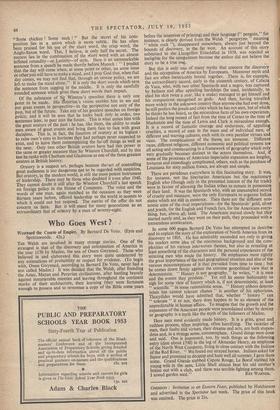Who Goes West ? .
Westward the Course of Empire. By Bernard De Voto. (Eyre and Spottiswoode. 42s.) THE Welsh are involved in many strange stories. One of the strangest is that of the discovery and colonisation of America in the year 1170 by Madoc, the son of Owen Gwynned. Those who believed in and elaborated this story were quite undeterred by any estimations of probability or respect for evidence. (To begin with, Owen Gwynned, according to Bernard De Voto, never had a son called Madoc.) It was decided that the Welsh, after founding the Aztec, Mayan and Peruvian civilisations, after battling bravely against innumerable enemies and leaving throughout the continent marks of their architecture, their learning (they were fortunate enough to possess and to reverence a copy of the Bible some years
before the invention of printing) and their language (" penguin," for instance, is clearly derived from the Welsh " pengwynn " meaning " white rock "), disappeared somewhere, always just beyond the bounds of discovery, in the far west. An account of this story submitted to the Llangollen Eisteddfod in 1858, was rejected as ineligible for the competition because the author did not believe the story to be .a true one.
But this is only one of many myths that concern the discovery and the occupation of America by Europeans. Moreover myth and fact are often inextricably bound together. There is, for example, the extraordinary record, early in the sixteenth century, of Cabeza de Vaca, who, with two other Spaniards and a negro, was captured by Indians and after appalling hardships (he used, incidentally, to shed his skin twice a year, like a snake) managed to get himself and his companions recognised as gods. And then, having travelled more widely in the unknown country than anyone else had ever done, he still prefers the jewels and cities which he has not seen, but of which he thinks he has heard, to the miraculous facts of his own experience. Indeed the long record of fact from the time of Cortez to the time of Mackenzie and the time of Lewis and Clark is miraculous enough. It is a record of fantastic courage and endurance, of appalling i cruelties, a record of men in the mass and of individual men, of different and warring cultures, each with its own peculiar virtues and vices. The complications of the theme are immense. Different races, different religions, different economic and political systems are all acting and counteracting in a framework of geography which only very gradually becomes distinct to the actors themselves. And, if some of the processes of American imperialist expansion are lengthy, tortuous and exceedingly complicated, others, such as the purchase of Louisiana for sixty million francs, are abrupt and simple.
There are paradoxes everywhere in this fascinating story. It was, for instance, not the libertarian Americans but the reactionary English who (though only in the presumed interest of the fur trade) were in favour of allowing the Indian tribes to remain in possession of their land. It was the Spaniards who, with an unexampled record of cruelty and massacre, were the only Europeans to organise Indian states which are still in existence: Then there are the different eco- nomic aims of the rival imperialisms—for the Spaniards' gold, silver and jewels, for the English and French furs, for the Americans every- thing, but, above all, land. The Americans started slowly but they started surely and, as they went on their path, they proceeded with a tremendous acceleration.
In some 600 pages Bernard De Voto has attempted to describe- and to explain the story of the exploration of North America from its discovery to 1805. He has admirably succeeded not only in giving his readers some idea of the enormous background and the corn- plexities of his various interwoven themes, but also in revealing at least something of the characters and the personal experiences of the amazing men who made the history. He emphasises most rightly the great importance of the real geographical situation and also of the various misconceptions of it that prevailed from time to time ; but he comes down firmly against the extreme geopolitical view that is deterministic. " History is not geography," he writes, " it is men and the events they produce." Yet still he seems fashionably to sigh for some view of history which is, if not deterministic, at least " scientific " in some rationalistic sense. " History abhors determ- inism but cannot tolerate chance " is another of his aphorisms. Thucydides would have admitted that, whether " history " can " tolerate " it or not, there does happen to be an element of the unpredictable in human affairs. To imagine that the growth and the expansion of the American people were preordained either by destiny or geography is a myth like the myth of the followers of Madoc.
Here men most evidently made history. It is a grim, great and ruthless process, often inspiring, often horrifying. The varieties of men, their faults and virtues, their dreams and acts, are both stupen- dous and, in a strange sense, commonplace. Grand things were done and said. One is impressed, too, by such things as the following entry (date about 1790) in the log of Alexander Henry, an employee of the North West Company, living in close contact with the Indians of the Red River. " We found our strayed horses. Indians asked for liquor and promised to decamp and hunt well all summer, I gave them some. Grand Gueule stabbed Capote Rouge, Le Boeuf stabbed his young wife in the arm, Little Shell almost beat his old mother's brains out with a club, and there was terrible fighting among them.


































 Previous page
Previous page